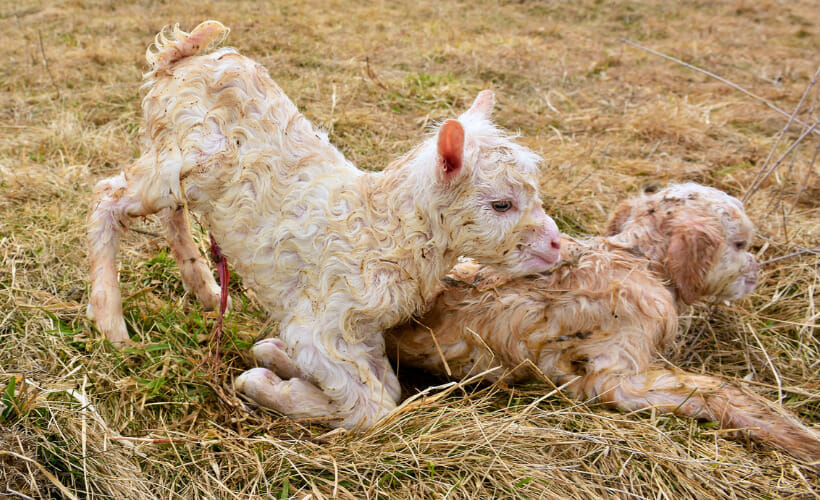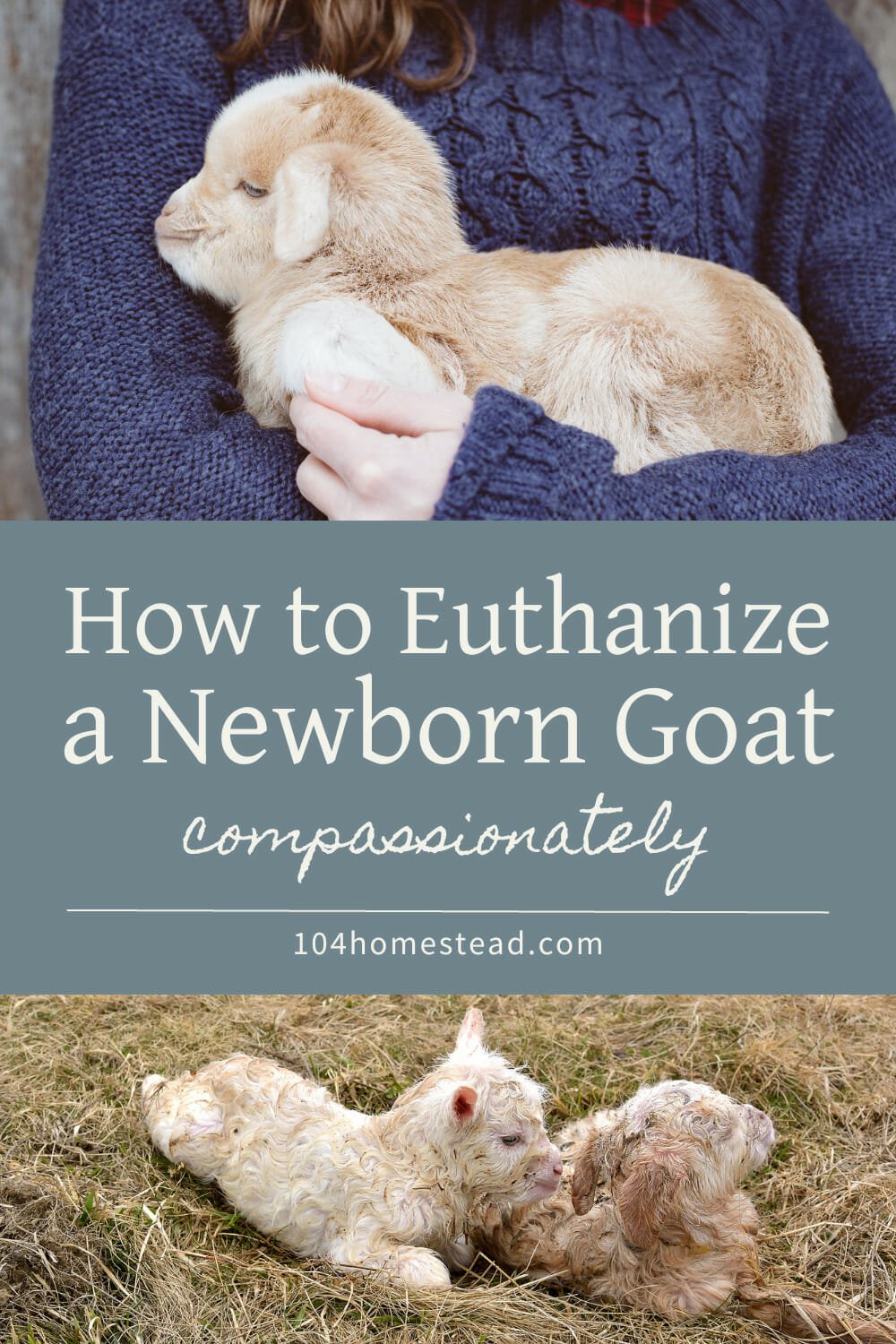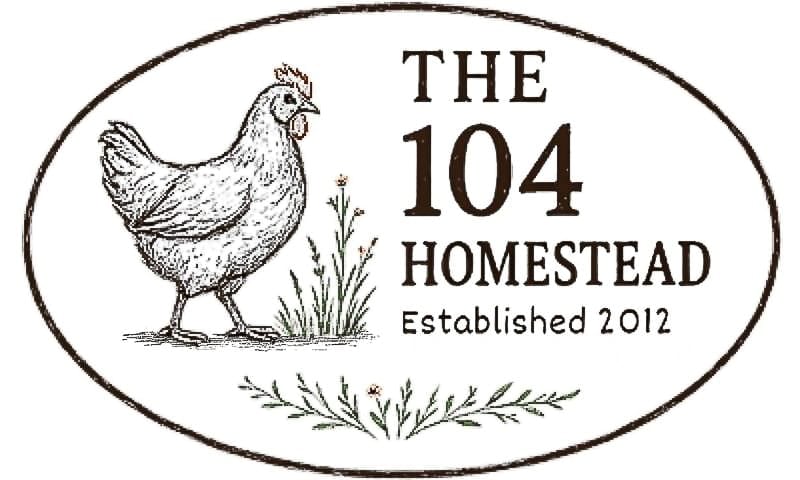How to Humanely Euthanize a Goat Kid
As a homesteader, you must be prepared to make hard decisions, such as learning how to euthanize a goat kid. This post has tips on how to do it with compassion.

There is a dark spot in homesteading that writers like myself don’t want to tell you about. Homesteading is an amazing and freeing lifestyle, but it comes with a cost when livestock are involved. Death. Most everyone has had a pet in their lives. Your pet may have passed naturally due to old age or died due to trauma. Maybe you had to put your pet down because it was sick or suffering. Making that decision sucks. Losing an animal sucks. That’s where the darkness of homesteading comes in—death on the homestead.
We are able to keep our dogs and cats relatively safe. We ensure their safety from predators by bringing them indoors at night. If our pet gets sick, we often can treat them with a trip to the veterinarian. Livestock is a different story. Livestock are exposed to predators day and night. We do what we can, but sometimes sh*t happens that is out of our hands.
If livestock gets sick, it can take over an entire herd or flock almost overnight. Visiting a vet often doesn’t resolve the issue, not to mention the cost and effort involved in medicating a large number of chickens. Homesteaders have to make the call. Often, it means starting over.
The Reality of Homesteading
The reality is that you have to be strong when you become a homesteader. As a homesteader, you must make difficult decisions and be prepared to handle the worst situations.
One of my friends recently came home from an evening out to discover that his livestock guardian dog killed his goat herd. There was no way to prepare for something like that. My friend had to put the dog down, adding insult to emotional injury. Do you think you won’t bond with your livestock? Think again.
Another friend of mine packaged up her meat birds to bring to the butcher. She knew these animals were being raised to feed her family, yet she treated them with care and respect. Unfortunately, she forgot to put air holes in the boxes, and the birds had died before she made it to the butchers. She was devastated that they had died in such a horrible way.
I have had to deal with planned and unexpected losses on my own homestead as well. In just the last year, I had two hens die in my arms because they hid their illness/weakness. Chickens don’t let you know they are dying until they literally can’t go on anymore. I sold one of my ducks for meat because we had too many drakes in the flock. I had to euthanize two hens because of an illness that I couldn’t afford to have run through my flock. We will be dispatching three more hens in the spring because we cannot afford to feed animals that no longer feed us.
If you don’t own chickens, this may not register with you. You may think, “Well, it’s just a chicken.” Trust me, even the strongest person cannot be callous when it comes to the death of a living creature, even a chicken. The chickens that will be dispatched in the spring have names and personalities. They are not our pets, but they are cared for and respected. They are living, breathing beings that are part of a flock, a family.
I’ve shared in the past about dealing with death on the homestead. Unfortunately, that’s just part of homesteading. Not a happy part, but one that will come knocking when you least expect it. This time, I’m sharing something that hurts me to the core. Something I hoped I’d never have to experience. I’m sharing because I didn’t know, and someday you might have to. How to euthanize a goat kid. You may disagree with this advice for on-farm euthanasia. That’s okay. Please don’t be cruel because my heart is raw from the experience.
Most goat pregnancies go smoothly. We’ve been present at every birth just in case but haven’t yet needed to intervene beyond opening a few sacs that didn’t break on impact and cleaning off some goat kids’ faces. The scariest moment we’d experienced until this most recent event was a breech baby that obviously took some fluid into its lungs. It wasn’t scary for me because I knew what to do, but my son (my assistant) was somewhat horrified when I picked up a sopping wet newborn kid and started swinging it by its back legs to get the fluid out. The baby goat was fine as can be after that. My son needed to talk it out a bit.
The Story of What Went Wrong
So, as I said, everything goes perfectly 99.9% of the time. One particular night, it seemed like everything was going wrong.
My veteran doe lost two babies in one kidding. The first was a tiny stillborn. It was perfect in every way, but it died just before it came out. You can always tell if a kid has been dead for a while. There is an odor. This one just smelled like a normal brand-new kid. I let Mama clean him while she worked on the second one. Things looked good at first. Then I scooted that second baby up to her nose so I could take the other one away. That’s when I saw it. This baby’s legs were all going in the wrong direction. Not just a little. The back legs were turned so that they curled all the way up to the tail. The front right shoulder was rotated up to the neck.
I called my friend, Carrissa, at Lone Feather Farm, knowing what she was going to tell me. Mama worked on pushing out baby number three while I cried on the phone, telling my friend I couldn’t do it. I couldn’t take the life of a baby goat. But the fact is, it was the right thing to do. She couldn’t survive. Even if we carried her around everywhere and bottle-fed her, her motor skills weren’t right. Why isn’t her head straightening out? Why are her eyes rolling back?
Baby goat number three arrived. Healthy. Perfect. I slid Baby Three in front of Mama’s nose and took Baby Two to the milking room. Emotion was taking over as I checked each joint. I was right. Three out of four legs were going the wrong way. Formed completely backward and not just stuck that way from a weird birth position. I had seen some oddly shaped legs that just needed a day or two to straighten out on their own. That wasn’t the case here. This goat had no hope of a quality life.
How to Euthanize a Baby Goat
Did you know that the term euthanasia is Greek for good (eu) death (thanatos)? It is defined as the hastening of the death of a patient to prevent further suffering.
If a vet is unavailable, the most humane way to euthanize a goat kid and give it a good death is by putting it in a bucket of warm water and just holding it. The reason why this is preferred is that the goat kid just came out of warm fluid. It offers a sense of comfort and familiarity. This technique would not be okay for an older goat kid. For older goats, Ontario offers comparisons for methods of euthanasia.
My friend offered to do it, but I can’t call myself a farmer and pass the buck when it gets too hard. This was important. I put the baby in, hand on its heart, and my dear, sweet friend put her hands on mine. We held her until the heartbeat stopped, and it was over. I’ve only had to do it this once, but the poor baby didn’t struggle. She peacefully passed away.
I share this because this could happen to you. Hopefully, it doesn’t. You may not have a friend on speed dial to support you. If you’re in this situation, I’m channeling strength to you. It hurts, but it’s the right thing to do.
Love to all my fellow homesteaders. I wouldn’t trade this life for anything, even during the hardest times.
It’s Okay to Care
I think people have it set in their minds that if you raise animals for a specific purpose, such as eggs, milk, or meat, magically, you disconnect from them. I’m not sure about you, but knowing that my livestock have expiration dates doesn’t change how I care for them. I sit out there and visit with them, feed them treats, and spend hours watching them play.
Do you know why most homesteaders raise their own produce? Because they want that animal to live the best life possible before its time comes. They’ve seen the videos of cattle with no grazing space and chickens who spend their entire lives in wire cages. Animal activists may think raising animals only for it to end in death is horrible, but look at the alternative. The people in the world will never stop eating animal products. Wouldn’t it be better if these animals were raised by farmers who care?

